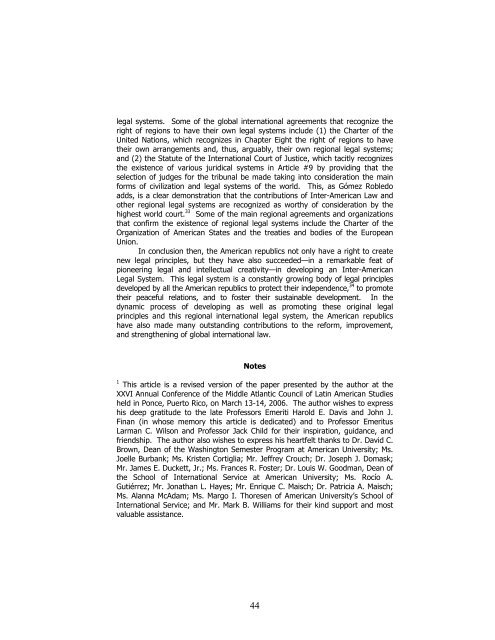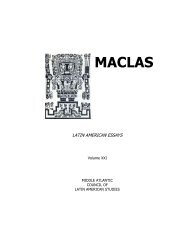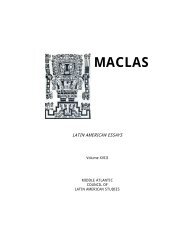latin american essays maclas
latin american essays maclas
latin american essays maclas
Create successful ePaper yourself
Turn your PDF publications into a flip-book with our unique Google optimized e-Paper software.
legal systems. Some of the global international agreements that recognize the<br />
right of regions to have their own legal systems include (1) the Charter of the<br />
United Nations, which recognizes in Chapter Eight the right of regions to have<br />
their own arrangements and, thus, arguably, their own regional legal systems;<br />
and (2) the Statute of the International Court of Justice, which tacitly recognizes<br />
the existence of various juridical systems in Article #9 by providing that the<br />
selection of judges for the tribunal be made taking into consideration the main<br />
forms of civilization and legal systems of the world. This, as Gómez Robledo<br />
adds, is a clear demonstration that the contributions of Inter-American Law and<br />
other regional legal systems are recognized as worthy of consideration by the<br />
highest world court. 33 Some of the main regional agreements and organizations<br />
that confirm the existence of regional legal systems include the Charter of the<br />
Organization of American States and the treaties and bodies of the European<br />
Union.<br />
In conclusion then, the American republics not only have a right to create<br />
new legal principles, but they have also succeeded—in a remarkable feat of<br />
pioneering legal and intellectual creativity—in developing an Inter-American<br />
Legal System. This legal system is a constantly growing body of legal principles<br />
developed by all the American republics to protect their independence, 34 to promote<br />
their peaceful relations, and to foster their sustainable development. In the<br />
dynamic process of developing as well as promoting these original legal<br />
principles and this regional international legal system, the American republics<br />
have also made many outstanding contributions to the reform, improvement,<br />
and strengthening of global international law.<br />
Notes<br />
1 This article is a revised version of the paper presented by the author at the<br />
XXVI Annual Conference of the Middle Atlantic Council of Latin American Studies<br />
held in Ponce, Puerto Rico, on March 13-14, 2006. The author wishes to express<br />
his deep gratitude to the late Professors Emeriti Harold E. Davis and John J.<br />
Finan (in whose memory this article is dedicated) and to Professor Emeritus<br />
Larman C. Wilson and Professor Jack Child for their inspiration, guidance, and<br />
friendship. The author also wishes to express his heartfelt thanks to Dr. David C.<br />
Brown, Dean of the Washington Semester Program at American University; Ms.<br />
Joelle Burbank; Ms. Kristen Cortiglia; Mr. Jeffrey Crouch; Dr. Joseph J. Domask;<br />
Mr. James E. Duckett, Jr.; Ms. Frances R. Foster; Dr. Louis W. Goodman, Dean of<br />
the School of International Service at American University; Ms. Rocío A.<br />
Gutiérrez; Mr. Jonathan L. Hayes; Mr. Enrique C. Maisch; Dr. Patricia A. Maisch;<br />
Ms. Alanna McAdam; Ms. Margo I. Thoresen of American University’s School of<br />
International Service; and Mr. Mark B. Williams for their kind support and most<br />
valuable assistance.<br />
44




